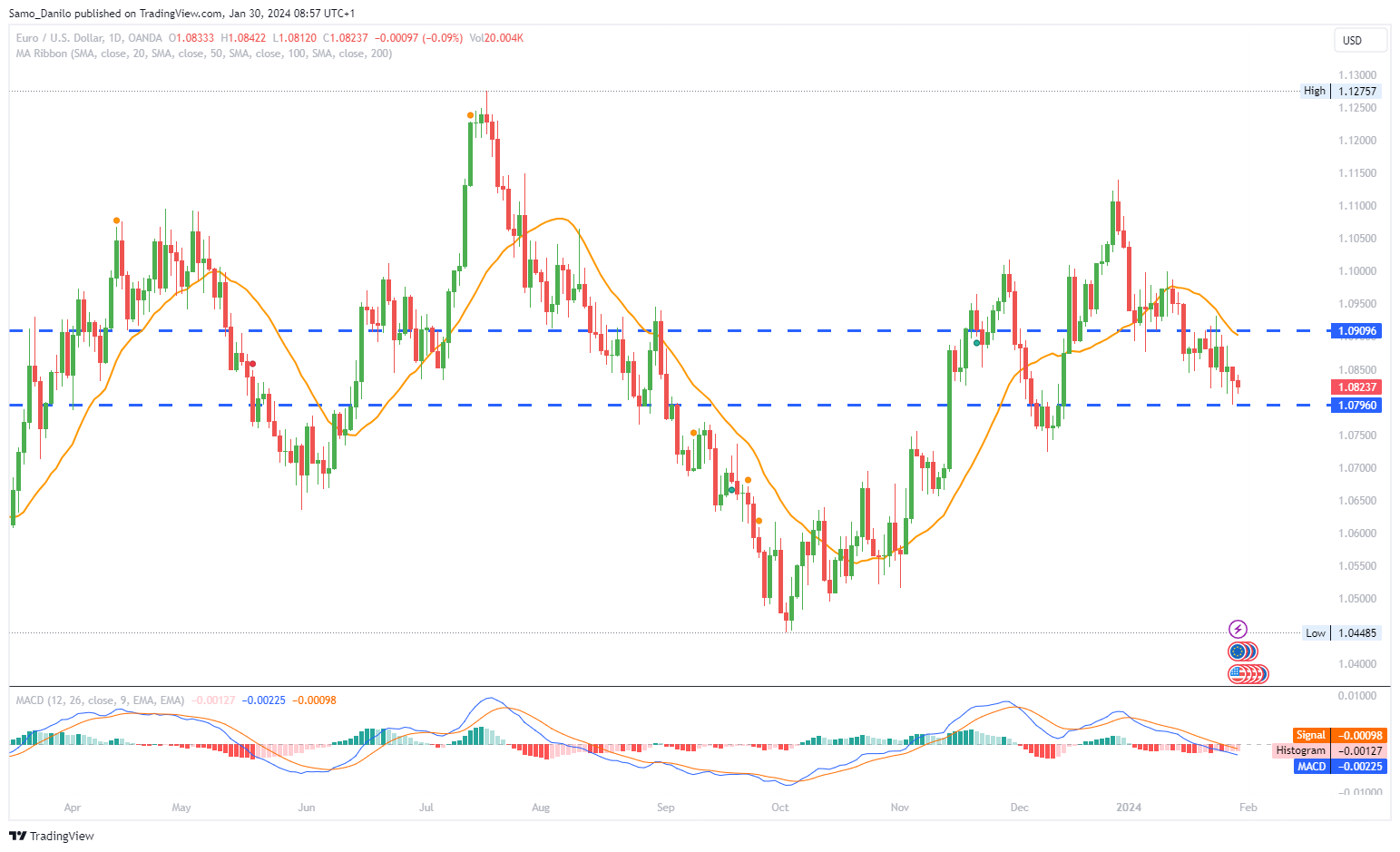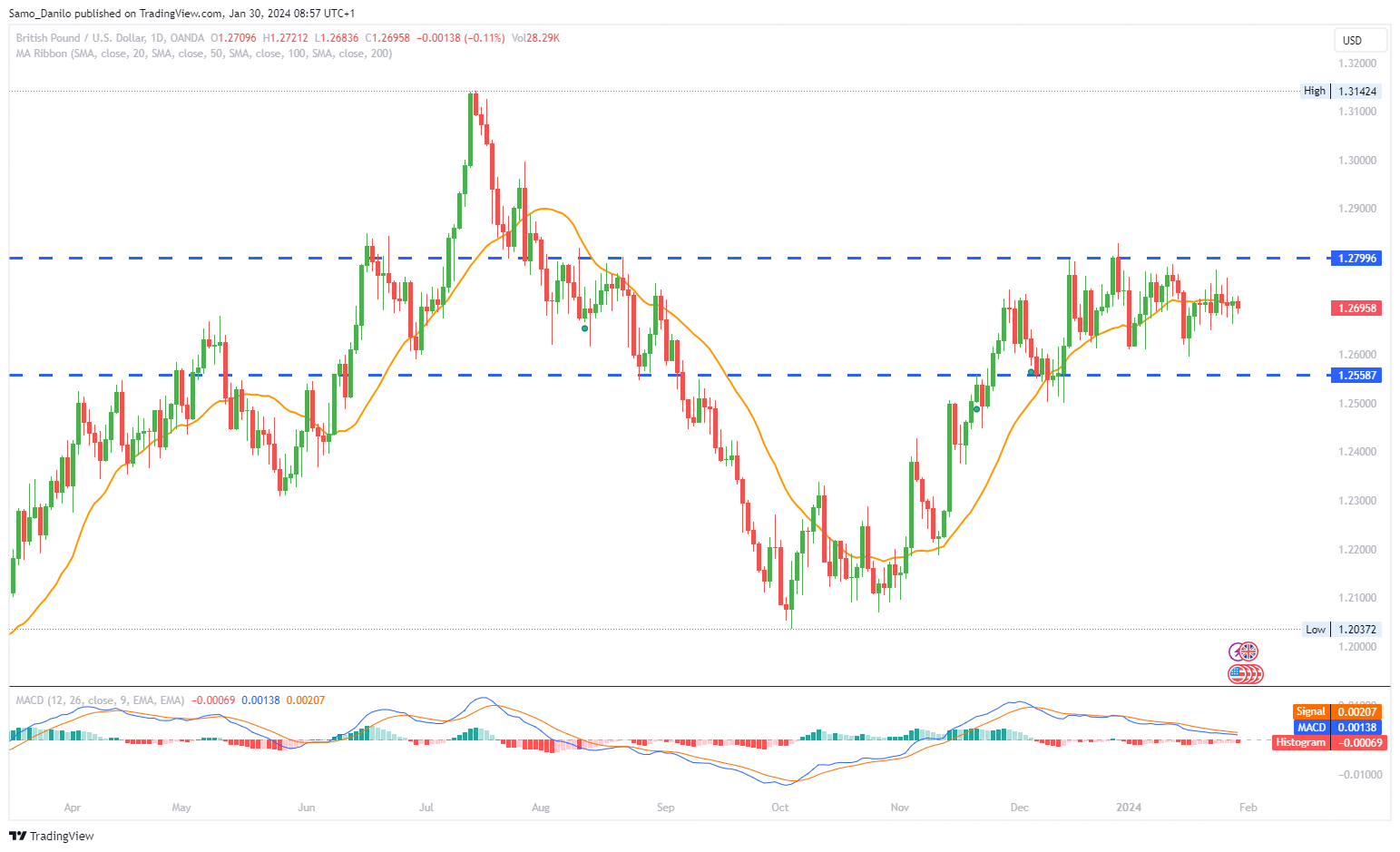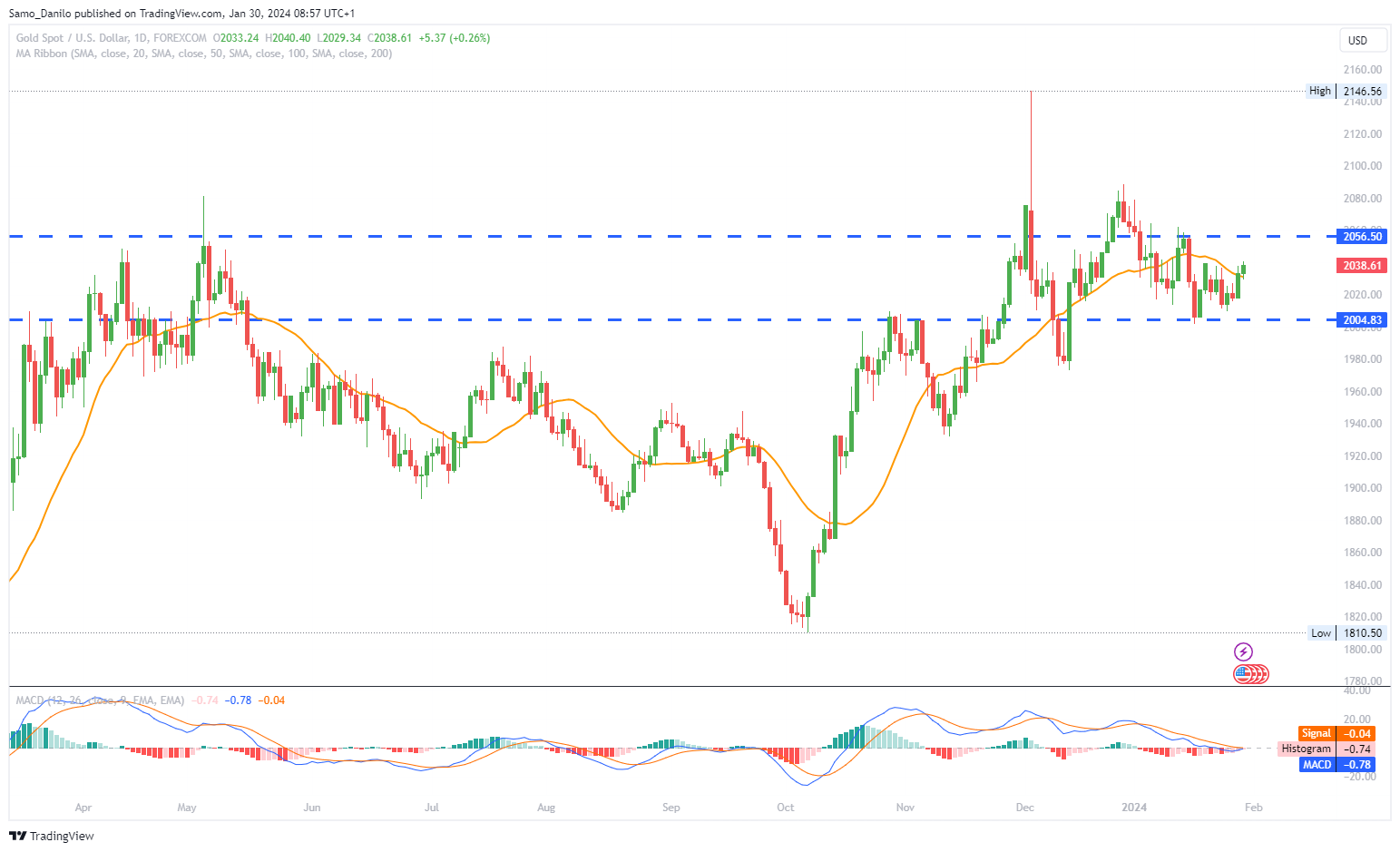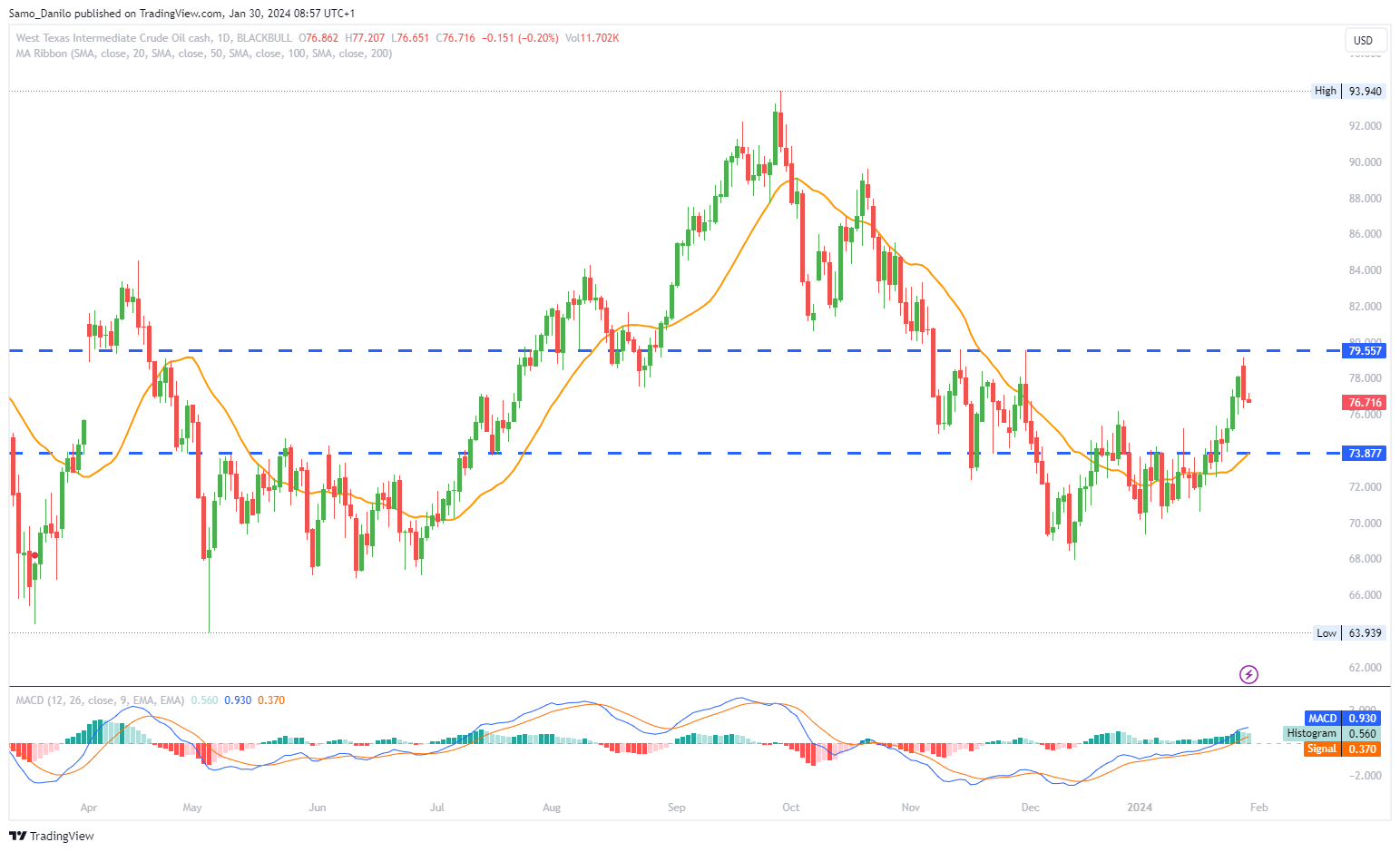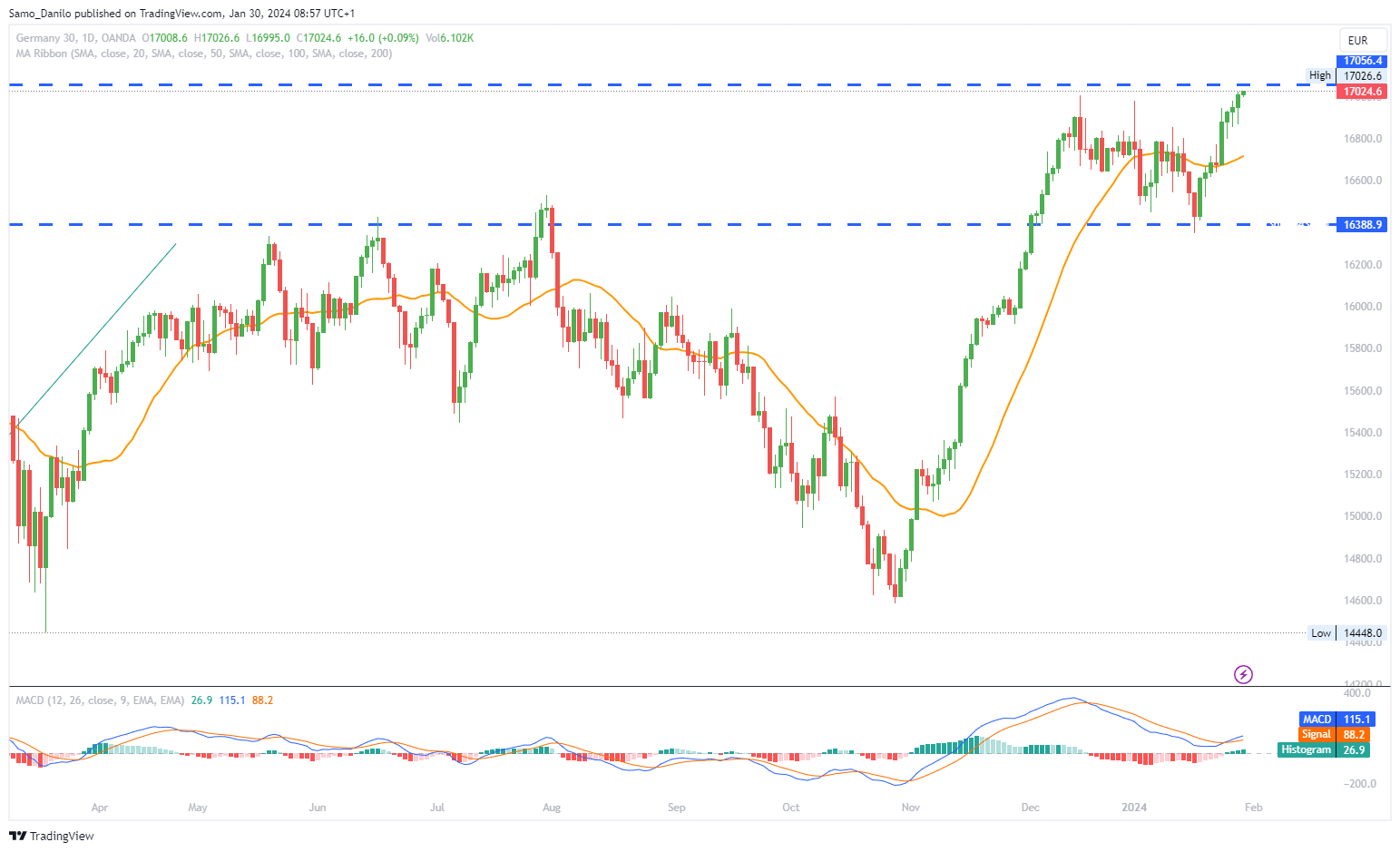EURUSD
- In early Europe on Tuesday, EUR/USD is observed declining toward the 1.0800 level, reversing from the near 1.0850 range. The movement in the pair is influenced by various factors, including dynamics within the USD.
- Market participants are still digesting the outcomes of the recent ECB event, which took place on January 25. During this event, the central bank decided to keep its policy rates unchanged.
- President Lagarde's communication during and after the event has been noted as dovish, contributing to the subdued price action of the European currency. Lagarde emphasized the ECB's commitment to data dependence and reiterated the possibility of an interest rate cut in the summer.
- Board member Centeno surprised the market by expressing a preference for interest rate cuts sooner rather than later. Such comments from key ECB figures can impact market expectations and influence the Euro's performance.
- Additionally, the usual prudence in the market ahead of the Federal Open Market Committee (FOMC) meeting is influencing the pair. The FOMC meeting is scheduled for January 31, and consensus among analysts suggests that the Fed will maintain its Federal Funds Target Rate (FFTR) unchanged at 5.25%–5.50%.
Closing statement: EUR/USD is under pressure, influenced by USD dynamics, dovish signals from the ECB, including President Lagarde's remarks and Centeno's unexpected stance, and the cautious approach before the upcoming FOMC meeting.
GBPUSD
- In European trading on Tuesday, GBP/USD is observed easing toward the 1.2700 mark. The movement in the pair is influenced by several factors, contributing to the overall market dynamics.
- The cautious market mood at the beginning of the week provides support to the US Dollar (USD), allowing it to stay resilient against its rivals. This resilience is making it challenging for GBP/USD to gather bullish momentum.
- Investors are growing worried about the potential negative economic impact of escalating geopolitical tensions in the Middle East. Such geopolitical uncertainties can lead to risk aversion in the market, benefiting safe-haven currencies like the US Dollar.
- A survey conducted by US bank Citi and polling firm YouGov showed that the UK public's inflation expectations for the twelve months ahead fell to 3.9% and 3.5% in November and December, respectively, from 4.2% in October. This data reflects changes in consumer sentiment and inflation expectations, which can have implications for monetary policy considerations.
- Market expectations suggest that the Bank of England (BoE) is likely to maintain its current interest rate of 5.25%. These expectations can influence the performance of the British Pound (GBP) against other currencies, including the US Dollar.
| SMA (20) | Neutral | |
| RSI (14) | Neutral |
|
| MACD (12, 26, 9) | Slightly Falling |
|
Closing statement: GBP/USD is facing resistance as the US Dollar benefits from a cautious market mood, geopolitical tensions impact investor sentiment, and the UK public's inflation expectations show a decline. Market expectations for the BoE's policy also play a role in shaping the pair's movement.
GOLD
- On the daily chart, gold price has successfully achieved a daily closing above $2,030, which marks the intersection of the 50-day Simple Moving Average (SMA) and the 21-day SMA. This technical development suggests potential strength in the precious metal.
- Global markets are exhibiting a risk-averse sentiment, and trading with caution. This cautious approach is attributed to concerns surrounding a deepening real estate crisis in China, particularly fueled by worries about Chinese demand. The recent court order for the liquidation of property giant China Evergrande Group has intensified these concerns.
- Gold is benefiting from intensifying geopolitical tensions in the Middle East. The global flight to safety theme is favoring safe-haven assets, and Gold, being a traditional safe-haven, is attracting demand under such circumstances.
- Attention is shifting towards the upcoming release of the US JOLTs Job Openings data. This data will be closely watched for fresh insights into the labor market conditions. It precedes the Federal Reserve's policy announcements on Wednesday and the Nonfarm Payrolls data release on Friday.
- Currently, markets are pricing in a 46% probability of a March Fed rate cut. However, it's noted that no rate change is expected following this week’s policy meeting.
| SMA (20) | Slightly Falling |
|
| RSI (14) | Slightly Rising |
|
| MACD (12, 26, 9) | Slightly Falling |
|
Closing statement: Gold has shown technical strength by closing above key levels. The cautious market sentiment, concerns about the Chinese real estate crisis, and geopolitical tensions in the Middle East are supporting Gold. The upcoming US JOLTs Job Openings data and the Federal Reserve's policy announcements will likely influence Gold's future trajectory.
CRUDE OIL
- During the Asian session on Tuesday, West Texas Intermediate (WTI) US Crude Oil prices have experienced a slight upward movement. This comes after a recent rejection slide from the 100-day Simple Moving Average (SMA) or a nearly two-month peak.
- A notable factor supporting oil prices is the further escalation of geopolitical tensions in the Middle East. These tensions are acting as a key driver, fueling concerns about the oil supply.
- The possibility of a direct US confrontation with Iran is highlighted, with Iran being a significant contributor to global oil supply. Any adverse developments in this regard could have a substantial impact on global oil supply, given that Iran exported around 1.2-1.6 million barrels per day or 1-1.5% of Crude Oil through most of 2023.
- Market participants are likely adopting a cautious stance ahead of the highly anticipated two-day FOMC monetary policy meeting starting on Tuesday. The Federal Reserve's decisions and statements during this meeting can significantly influence market dynamics, including oil prices.
- The American Petroleum Institute (API) is scheduled to publish US stockpile data on Tuesday. This data release is anticipated to provide additional insights into the supply-demand dynamics in the oil market and could influence Crude Oil prices.
| SMA (20) | Slightly Rising |
| |
| RSI (14) | Slightly Rising |
| |
| MACD (12, 26, 9) | Rising |
|
|
Closing statement: WTI Crude Oil prices have ticked higher, supported by escalating geopolitical tensions in the Middle East. The potential impact of a US-Iran confrontation on global oil supply is a significant consideration. Market participants are cautious ahead of the FOMC meeting, and the upcoming API stockpile data release may add further impetus to oil prices.
DAX
- On Monday, ECB Vice President Luis de Guindos discussed progress toward taming inflation. He expressed optimism about the evolution of inflation, indicating that positive developments in inflation may eventually be reflected in monetary policy. However, he emphasized that the ECB's actions will be dependent on data and not on a predefined calendar.
- There were no significant economic indicators for Germany or the Eurozone on Monday, leaving investors to base their decisions on other factors and external developments.
- The Dallas Fed Manufacturing Index numbers for December were released on Monday. Despite a decline from -10.4 to -27.4 in January, these figures did not significantly impact on investor sentiment.
- On Tuesday, investors are expected to closely monitor the release of Q4 GDP numbers for Germany and the Eurozone. Economists anticipate a contraction of 0.3% in the German economy for Q4 after stalling in the previous quarter. These figures can provide insights into the economic performance of both Germany and the broader Eurozone.
- Beyond economic indicators, ECB Chief Economist Philip Lane is scheduled to speak. Investors will be attentive to his comments on the economic outlook, inflation trends, and any indications regarding interest rates. Such statements from key figures within the ECB can influence market sentiment.
| SMA (20) | Slightly Rising |
| |
| RSI (14) | Rising |
|
|
| MACD (12, 26, 9) | Slightly Rising |
|
Closing statement: In summary, recent comments from ECB Vice President Luis de Guindos and the upcoming GDP numbers for Germany and the Eurozone are key factors impacting investor decisions. Additionally, the speech by ECB Chief Economist Philip Lane will be closely watched for insights into the economic and monetary policy outlook.
